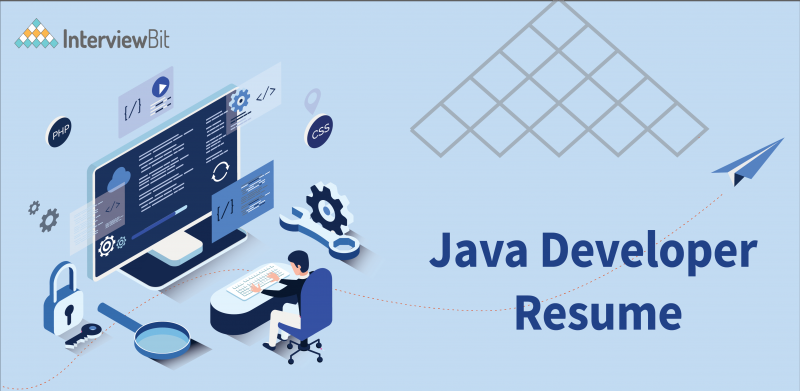Introduction
With new technologies sweeping the industry, the demand for Java is never-ending. A number of tech giants have always used Java to build their systems. Therefore, Java developers are highly sought after, especially in organizations that develop Java-based applications. Java developers can find a job at any stage of their career and in many different areas of specialization. However, Java development is a competitive field, and employers seek candidates who possess different programming and software skills. Therefore, it is imperative that your competence, value, and abilities be proven to any potential employer before they hire you.
A well-written, clear Java developer resume is crucial in this scenario. It doesn’t matter if you’re an experienced Java developer or if you’re stepping up into a new role: your Java developer resume has to grab the attention of hiring managers. The question then is: How can you showcase your Java Developer skills on your resume so that potential employers are more drawn to you?
That’s the reason we created this detailed guide for you. In this article, we’ll discuss the tips and techniques of creating a Java developer resume that will differentiate you from other candidates.
Confused about your next job?
Let’s first understand what a Java Developer is.
Who is a Java Developer?
Java remains one of today’s most popular programming languages, resulting in a high demand for Java developers. The programming language is used by companies around the world to develop and support their products.
A Java Developer, as the name suggests, is responsible for designing, developing, managing, and maintaining Java-based applications. Additionally, they integrate Java into business applications, software, and websites in collaboration with other web developers. As a Java developer, you should have a solid understanding of the core concept of Java, object-oriented design, and software debugging. As part of a product’s life cycle, they are involved in the entire software development process.
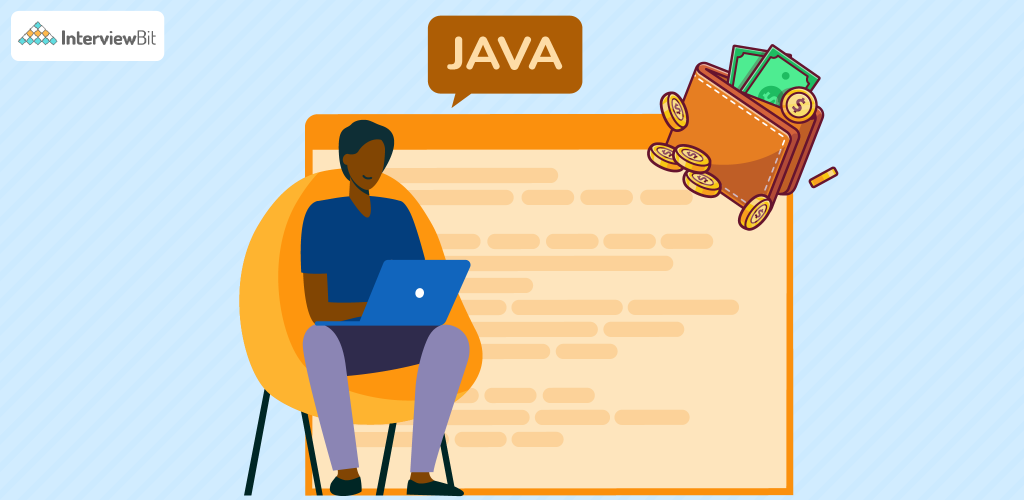
What does a Java developer do?
As part of the application’s life cycle, Java developers undertake many tasks, from product conception to evaluation. The role and responsibilities of Java developers may vary depending on their company and position. The following are some of their responsibilities:
- Design, implementation, and maintenance of Java applications.
- Writing efficient, testable, and well-designed code in Java
- Delivering high performance and availability
- Developing detailed and high-quality projects.
- Maintaining the efficiency of the project by performing unit tests. This is done by using automated unit test frameworks.
- Identifying risks and developing mitigation measures.
- Be involved in the architectural design and software development processes.
- Perform software analysis, testing, programming, and debugging to ensure that the project specifications are up-to-date.
- Analyze production and non-production application issues and take immediate action.
Java Developer Resume
You may not know it, but your resume is often the first impression that potential employers have of you. Therefore, to make a good first impression, you must make sure your resume stands out from the rest. Here’s how to write a Java Developer Resume that will set you apart from the fierce competition for Java jobs.
Importance of a Java developer resume
A Java Developer resume basically summarizes your skills and experience, work history, educational background, and, most importantly, the accomplishments you have achieved with past employers. In addition, it informs the hiring committee of your career objectives and conveys concisely what you will bring to the role.
Even though Java developer jobs are in high demand, you still need to ensure your resume reflects the qualifications employers seek. Highlight your past experiences, certifications, achievements, and most importantly, don’t forget to highlight your industry-relevant skills. The best resumes balance explaining your background with letting your accomplishments speak for themselves.
Writing a resume may not seem easy, especially if the job is as specialized as a Java developer. No worries, though – we can help!
Throughout this article, you’ll learn what it takes to succeed at your next Java Developer interview. As you read this article, you will learn what a Java developer is, what his roles are, and what it takes to create an impressive Java developer resume. Furthermore, a comprehensive resume template is also included for your convenience. Let’s start now!!!
Create a header
In any resume, the first thing a recruiter will notice is the header, so keep it clear, concise, and straightforward. This is a section in which you tell recruiters a little about who you are. As an introduction, you will simply provide personal details that allow you to introduce yourself and won’t attempt to convince or prove your expertise. The details to be added are detailed below.
As a developer, you know you cannot make mistakes in your code. The same goes for the contact section in a resume. Providing incorrect information will make it ineffective. Obviously, information should be easy to access, color-coordinated, and titled, as well as self-explanatory. Incorporate the following components into your resume header:
Critical Details:
- Name
- Address (City, State)
- Contact Information (Email and Phone number)
- Github/Personal Blog/Portfolio/Linkedin profile Link
You must provide all of these details in order for recruiters to contact you for an interview. These details, while seemingly insignificant, can be helpful in reaching out to the right employer. The following Java developer resume samples demonstrate the difference between the right and the wrong format of the header section:
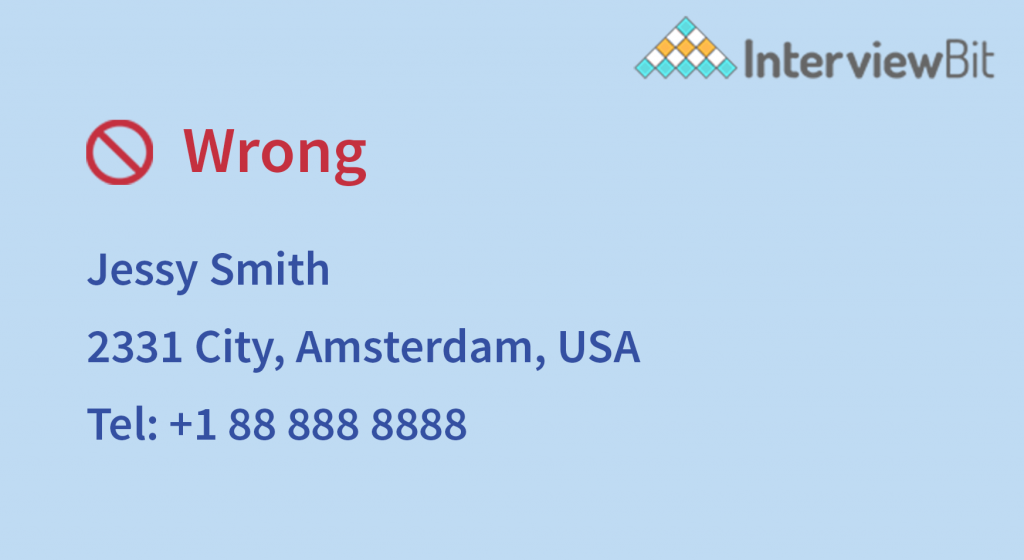
Note: Hiring managers want to know more about your past work, which is why you should include a link to your portfolio, whether it’s on your personal webpage or on Github. If you don’t have one, you can also include a link to your LinkedIn profile. Also, be sure to include your email address.
Right Format:
Name: Jessy Smith
Java Developer
Email: resumeexample@gmail.com
Phone: your phone number
Address: 123 street, city, state 12345.
Linkedin profile link: linkedin.com/in/jessy.smith
Website link: example123.com
Write a Professional/Effective Resume Summary
You want to beat the 150+ other candidates. The question is, how?
A Java developer resume objective or summary is sure to knock them out. With an effective summary, you will be miles ahead of your competitors. Employing the right words convinces hiring managers that you can positively impact their organization. Overall, the summary should be short, crisp, and complete. Summarize your most relevant work experiences and skills in a few sentences. Describe your strengths by emphasizing your adaptability, work ethic, and productivity, as well as by highlighting your best technical capabilities. Include the following information in your resume summary:
- Describe any relevant experience and/or skills
- Describe your strongest qualities/traits
- Previously used technologies (if any)
- Java Developer achievements
The following Java Developer resume samples demonstrate the difference between the right and the wrong format of Summary:

Note: This wrong example does not say much. Honestly, this looks and sounds like a generic blurb anyone could write. The tone also fails to convey the candidate’s enthusiasm and motivation.
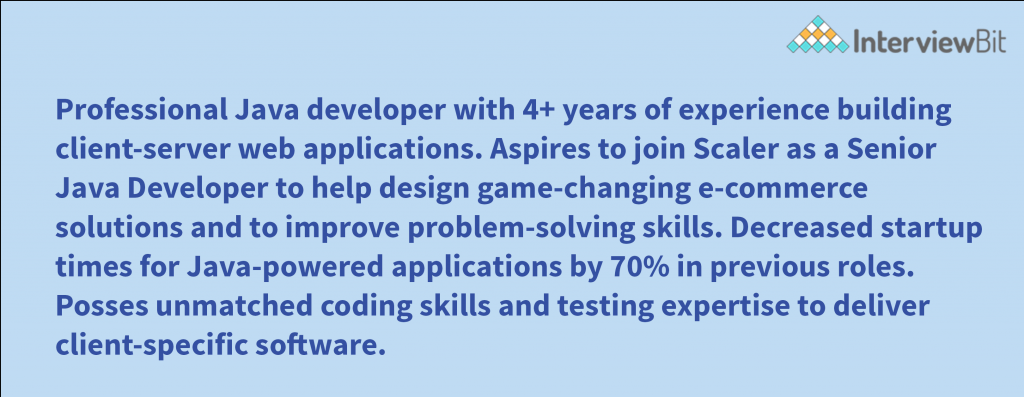
Write professional Experience
Professional experience is an essential component of every Java developer’s resume. In the world of Java development, a resume showcasing professional experience will stand out from the crowd. In general, resumes are one page long, but for each 4-5 years of experience, another page can be added. In addition to your experience, what matters is how well you explain your career path. The best way to organize your experience section is as follows:
- Position name
- Company Name
- Dates
- Responsibilities & Achievements
Freshmen can talk about the projects and services on which you worked and explain their role. If you have prior experience, describe your job role, the projects you worked on, and your accomplishments at your previous company. Provide an overview of the main responsibilities of each position with emphasis on those relevant to Java development. Explain your work by using action verbs (e.g., “analyzed,” “planned,” “documented,” and “executed”), and provide specific details of your accomplishments. Practical experience will prove to potential employers that you possess the skills they desire. The following Java Developer resume samples demonstrate the difference between the right and the wrong format of the professional experience section:
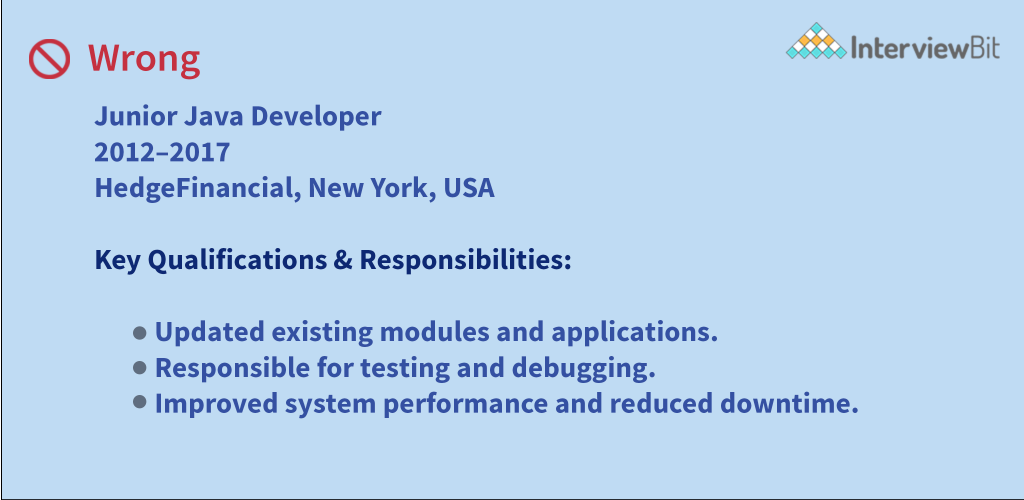
Note: This resume experience is riddled with problems. Recruiters may think that the candidate didn’t put any effort into listing the role and achievements they had. Keep in mind, competition is fierce. Your work experience gives you another opportunity to stand out. It would be beneficial to have more job-specific roles with unique skills and technologies. As such, you should focus on your achievements and not simply your daily responsibilities.
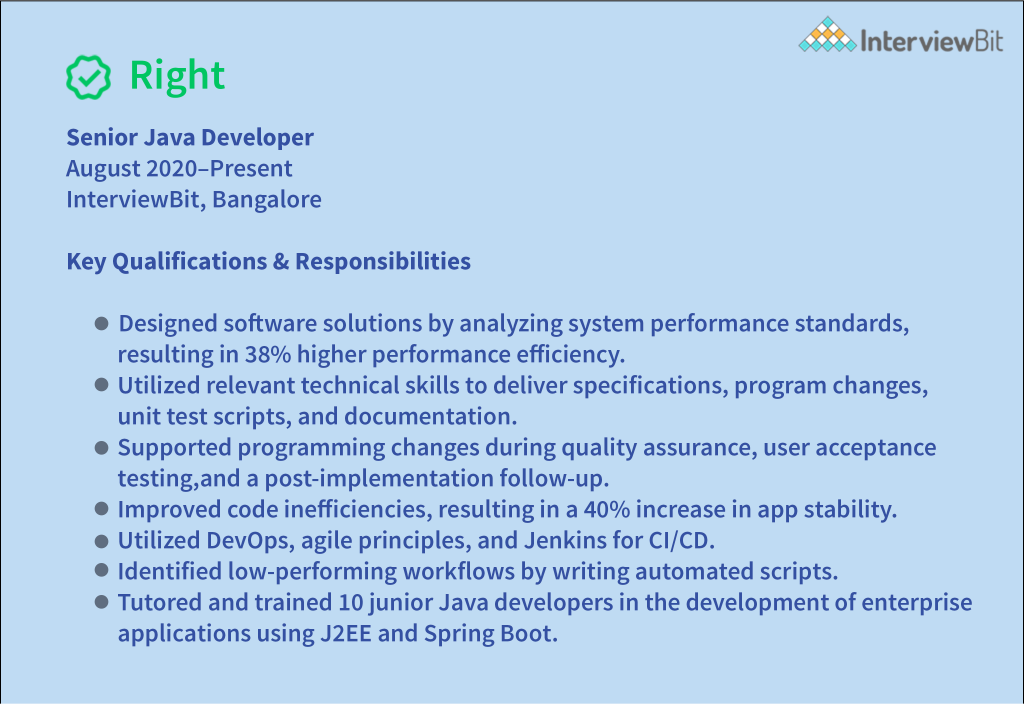
Junior Java Developer
January 2015–July 2020
Infosys, Pune
Key Qualifications & Responsibilities
- Designed and developed software applications with minimal supervision.
- Analyzed data usage, data flow, and work processes, as well as identifying problems.
- Continuously improved the functionality of web applications using JSPs and Servlets.
- Reduced data loading time by 60% by writing clean code.
- Worked with an offshore team and vendors to ensure full performance and functionality of database management applications.
- Redesigned applications to meet changing market trends and individual customer needs.
Write Educational Section
Following your real-world experience, you should mention your education. In any case, the education section on your resume still needs to be optimized to have the greatest impact on hiring managers. Be more than just a name-dropper. School names aren’t enough. The following format should be used for listing your education history:
- Degree Type & Major
- University Name
- Years studied
- Courses, GPA, and anything else you think may be relevant
Java freshers must pay special attention to the education section of their resumes. However, as your career progresses, recruiters will become more interested in your professional accomplishments. Therefore, when creating Java resumes with 5+ years of experience, limit yourself to including degree earned, university name, and years of studies. The following Java Developer resume samples demonstrate the difference between the right and the wrong format of the education section:
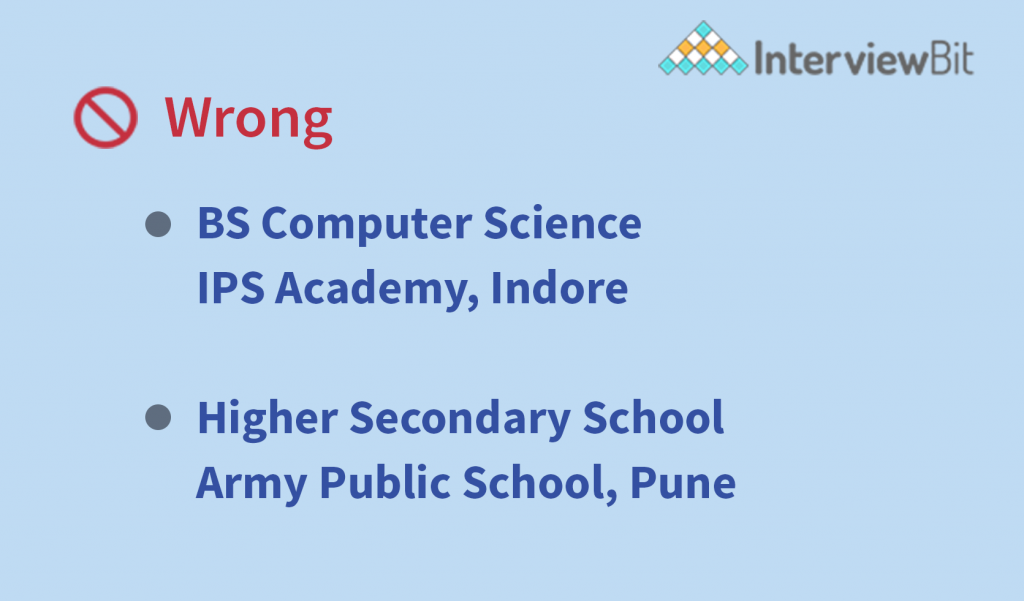
Note: Those with a college degree do not need to include high school unless they have relevant skills to add to their education. Be sure to mention any classes you’ve taken that pertain to Java development to prove that you’re an ideal candidate.
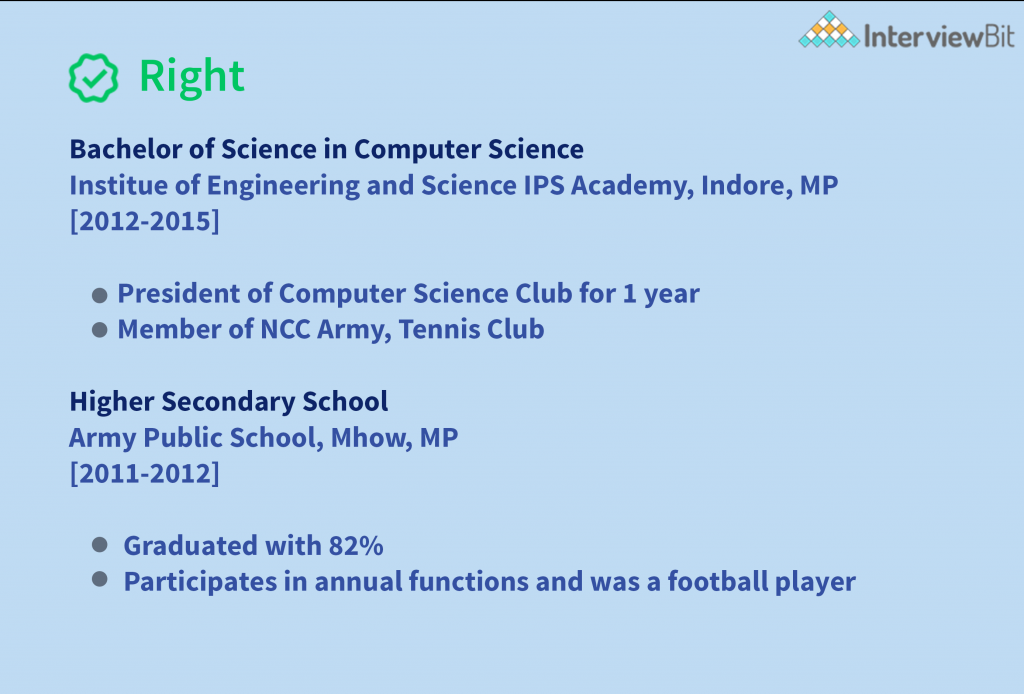
Write your Java Developer skills
Let’s boost your resume.
Depending on the job, Java developers can wear different hats and fill multiple roles. In order to excel at your job, you must master a lot of technologies and frameworks. This is where you demonstrate your skills. Your resume should highlight the best and most relevant skills that you have and include unique tools and technologies that you have worked with.
Prior to that, you must ask yourself: What does the company want?
Employers/Recruiters don’t have time to go through each resume individually. Employers typically look for certain skills in potential candidates, so knowing how to properly write the resume skills section is crucial for Java developers. It is unlikely that you will get an interview if your resume does not demonstrate the skills they are looking for. When writing your resume, you should focus on industry-leading skills and avoid generic skills. It is better to write Java skills first, followed by other skills. The following Java Developer resume samples demonstrate the difference between the right and the wrong format of the skills section:
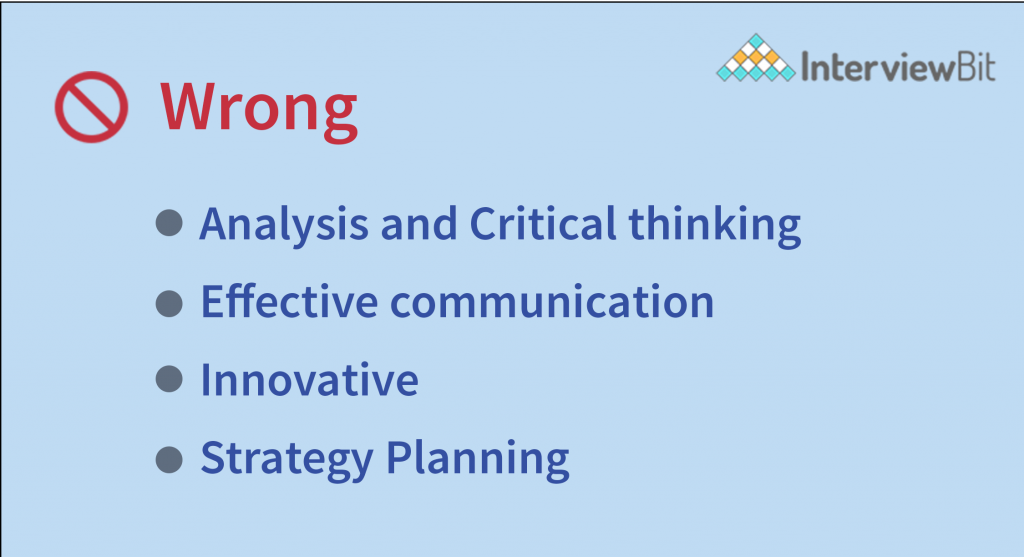
Note: Employers will not feel confident that you have the necessary skills and knowledge if you include generic skills. If you want to avoid this situation, make sure your resume reflects all the relevant skills needed for the job. Instead, put industry-specific skills on your resume. Don’t lie on your resume either. Don’t list skills that you don’t have.
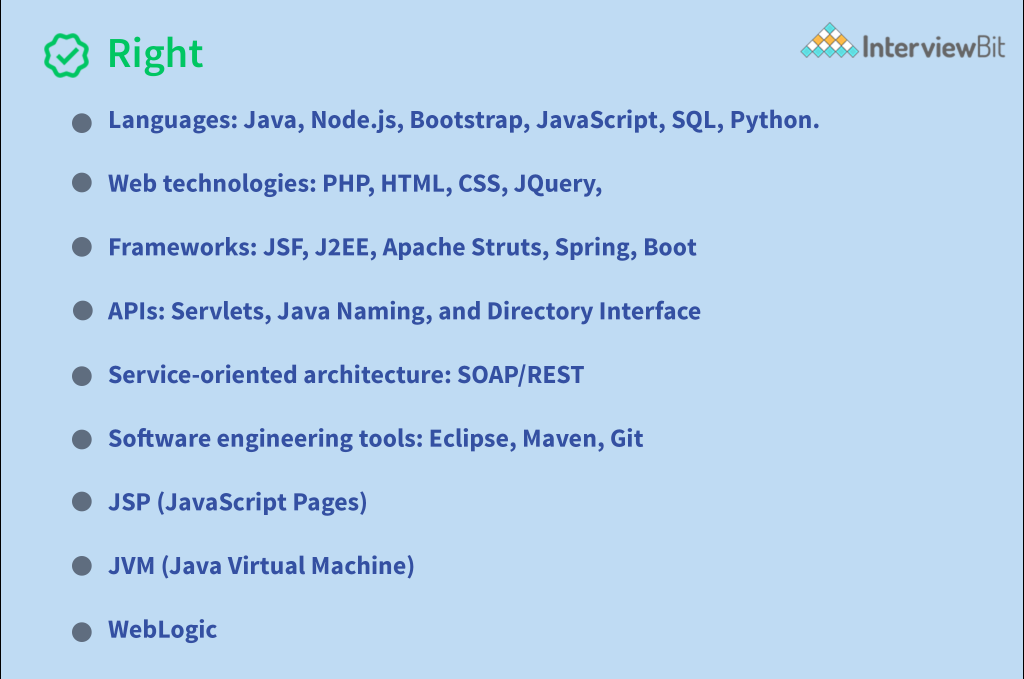
Other (Optional) Sections
Having covered the essentials, is there anything else we can talk about?
Well, if you are interested in getting an interview, yes! Shortlisting should be easy with just the basics, but adding these extra sections can make all the difference. Your interests, hobbies, and languages become less relevant on your resume as you gain more professional experience. In contrast, if you are an intern, an entry-level employee, or a recent graduate, demonstrating the proactive application of your knowledge can be considered a sign of initiative. Common ones include:
Projects: Companies tend to prefer applicants who are passionate about coding. Having personal or company projects shows you have a passion for the job, and are not just there to earn a living. To get your foot in the door, try building your own app or website as a side project, writing about JavaScript for a blog, or looking for freelance work on job boards.
Achievements: The success of a Java programmer is measurable by hard numbers. Therefore, quantifying your achievements is imperative. Providing employers with data that demonstrates your key accomplishments will allow them to see how capable you are.
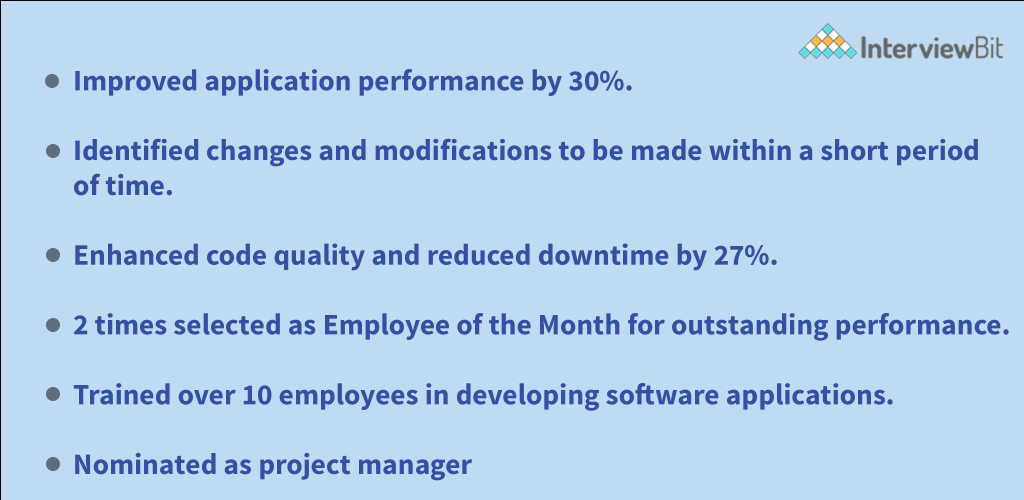
Certifications: Earning a certification can demonstrate your dedication and drive to succeed. Have you received any awards during your studies? Do you have any third-party certifications? If so, include them in your resume!
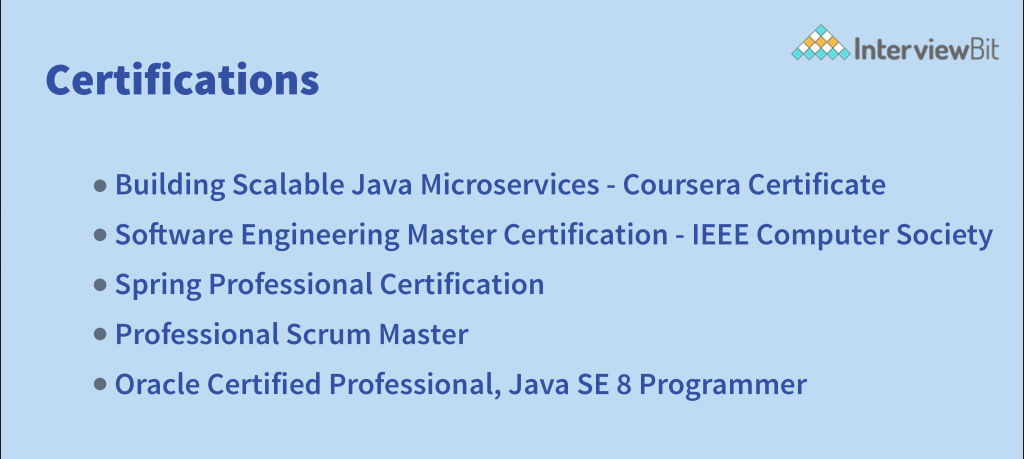
Languages: Obviously, you’re wondering, “how does a second language relate to Java skills?” Well, it doesn’t. Knowing another language is always impressive, even if it has no impact on your work. Being able to speak multiple languages broadens your career opportunities. This can also lead to advancement and higher wages, as well as job security.
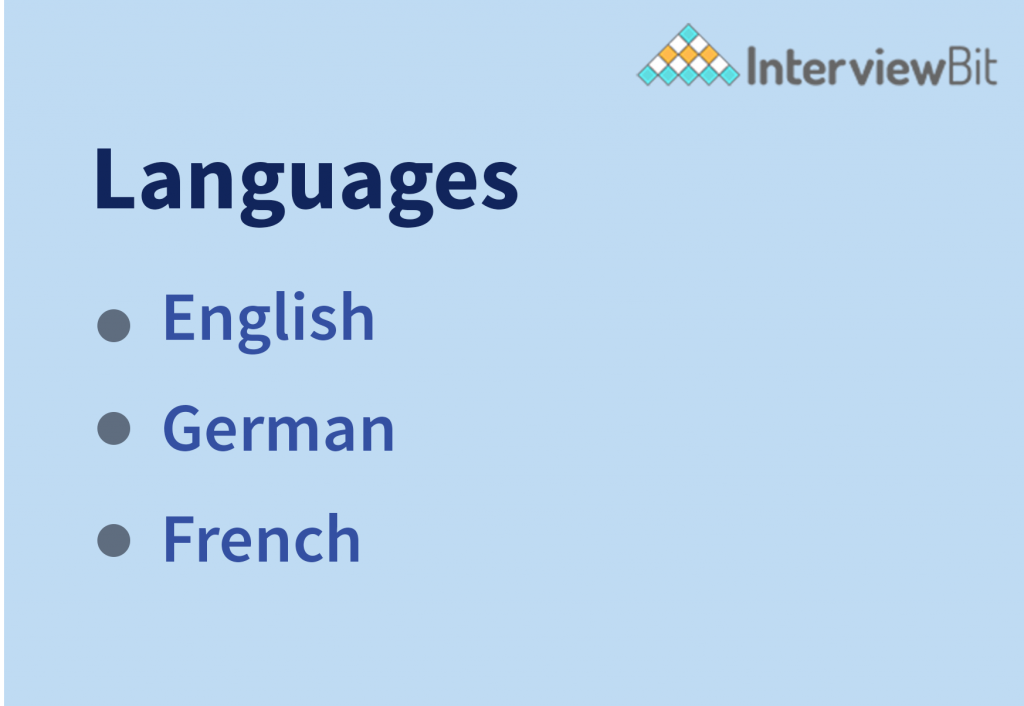
Hobbies and interests: Hobbies and interests show an employer that you are a well-rounded individual with a strong work ethic. After all, hobbies display WHO you really are. Having interests outside of work makes people a great asset to a company. The best way to state hobbies is in relation to the specific job requirements.
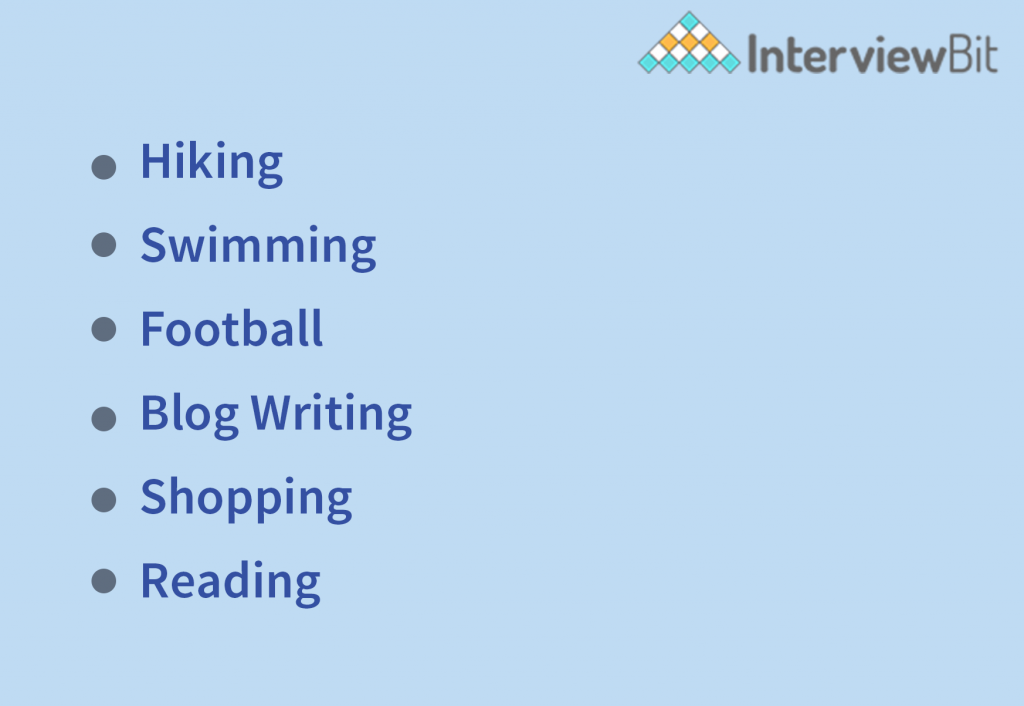
Listing volunteer work: Perhaps adding a section about volunteer work would be helpful as well. You can showcase your interests and abilities by including volunteer work on your resume. Volunteer work can strengthen your resume even if you do not have professional experience. Furthermore, it is a great way to demonstrate your professional skills and willingness to serve.
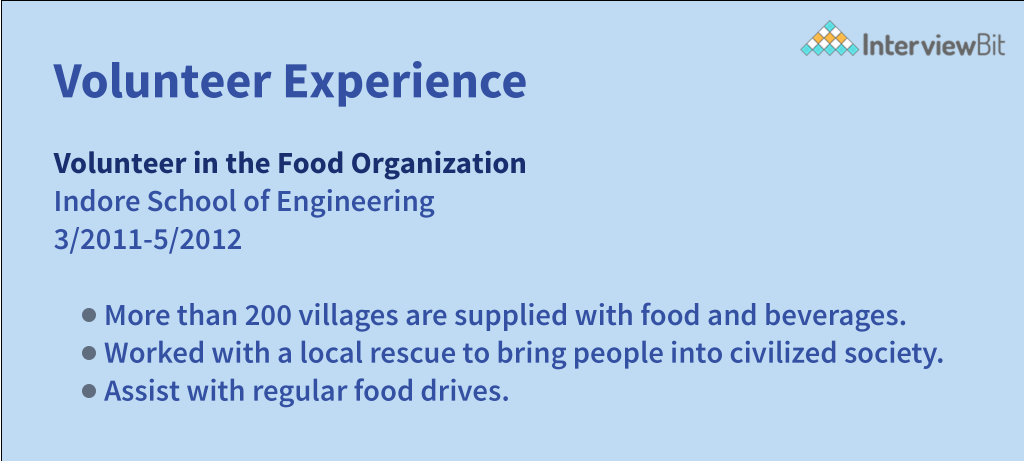
Having these sections at your fingertips means that there is no need to adhere to any specific guidelines. There is some leeway here. Additionally, you can describe a particular project you completed or the reason you were recognized.
Java Developer Resume Sample
Conclusion
Follow this guide to craft a resume that will increase your chances of landing a coveted Java developer job.
As of now, you should be receiving an interview call. Even if you have years of experience, there is always a way to enhance your resume so that it stands out from the rest. Here are some do’s and don’ts to remember when writing a resume. The tips below will make writing a resume easy.
Do’s
Here are some of the things you should keep in mind when you are drafting a resume:
- Your Java developer resume should serve one purpose: to rapidly convince the hiring manager that you deserve an interview. Be sure to tailor your resume to each position you apply for.
- Ideally, your resume should discuss your experience, skills, and projects as a Java developer. Keeping your resume to one page is a good idea if you have less than 4-5 years of experience. However, make sure your resume is free from grammatical errors.
- Do not go into every detail, but rather focus on specific accomplishments. Provide data and statistics to demonstrate your abilities. Even a single number can influence an employer’s decision.
- As you might imagine, the summary/objective is like your “elevator pitch.” It should highlight your key qualifications and accomplishments in a few sentences.
Dont’s
To the contrary, one must avoid the following things on a resume:
- Don’t overexplain yourself in your resume. Resumes shouldn’t list mundane tasks or irrelevant duties. Emphasize only relevant qualifications and achievements with short, punny bullet points. Limit the length to two pages or less.
- Do not include unnecessary personal information such as your age, gender, hobbies or interests, and any other extra content.
- Negative remarks about a former employer should be avoided.
- Don’t forget to proofread your resume before sending it. An employer won’t look favorably on a resume that contains even the smallest mistake. The resume must be relevant, accurate, and free of grammar, spelling, and formatting errors.
- Skills related to Microsoft Word, communication, and interactivity should not be included. This is because you should already be familiar with Microsoft Word and the internet. Highlight your strengths on the resume.
FAQs
Q. What is the role of a Java Developer?
A. Java developers oversee the design, implementation, and maintenance of Java-based applications, as well as the testability, scalability, and efficiency of code. They are also responsible for testing and debugging new applications and updates. The popularity of Java makes it an indispensable tool for large organizations, so the daily responsibilities of Java developers fluctuate widely, from working on one application to managing several at once.
Q. Is Java developer a good career?
A. Java developers are still in high demand, despite competition from new programming languages; in fact, Java is among the most popular programming languages. As a Java developer, you will have excellent career advancement opportunities. With the right qualifications, interests, and experience, you can advance to a technical or managerial role, such as a technical architect or principal architect. It is therefore wise and rewarding to pursue a career as a Java developer.
Q. Is Java useful in 2022?
A. Since its inception, Java has grown to become one of the most popular and in-demand programming languages for enterprise applications. Due to Java’s robust community, enterprise support, and growing popularity among programmers, it will remain the top choice for most businesses. Java’s career prospects are unlikely to fade anytime soon.
Q. How do I add Java skills to my resume?
A. Java developers may wear different hats and play multiple roles, depending on the job. Highlight your best and most relevant skills on your resume and include any unique tools and technologies you worked with. Unless your resume includes the skills employers are looking for, you are unlikely to be interviewed; therefore, make sure your resume includes all the relevant skills that are required for the position. Avoid generic skills and focus on industry-leading skills.


